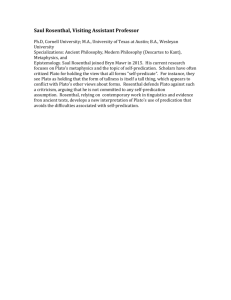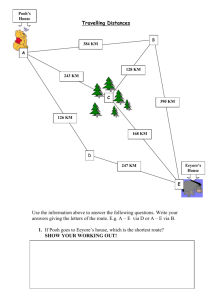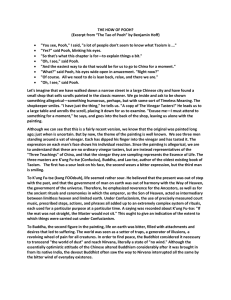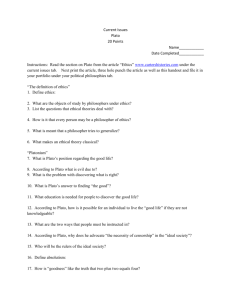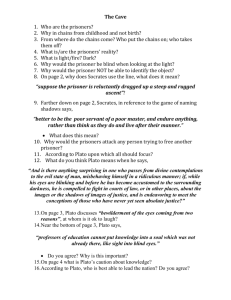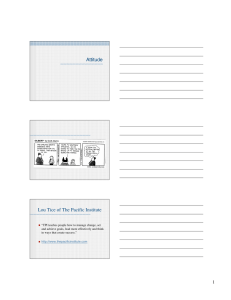Schedule of Topics
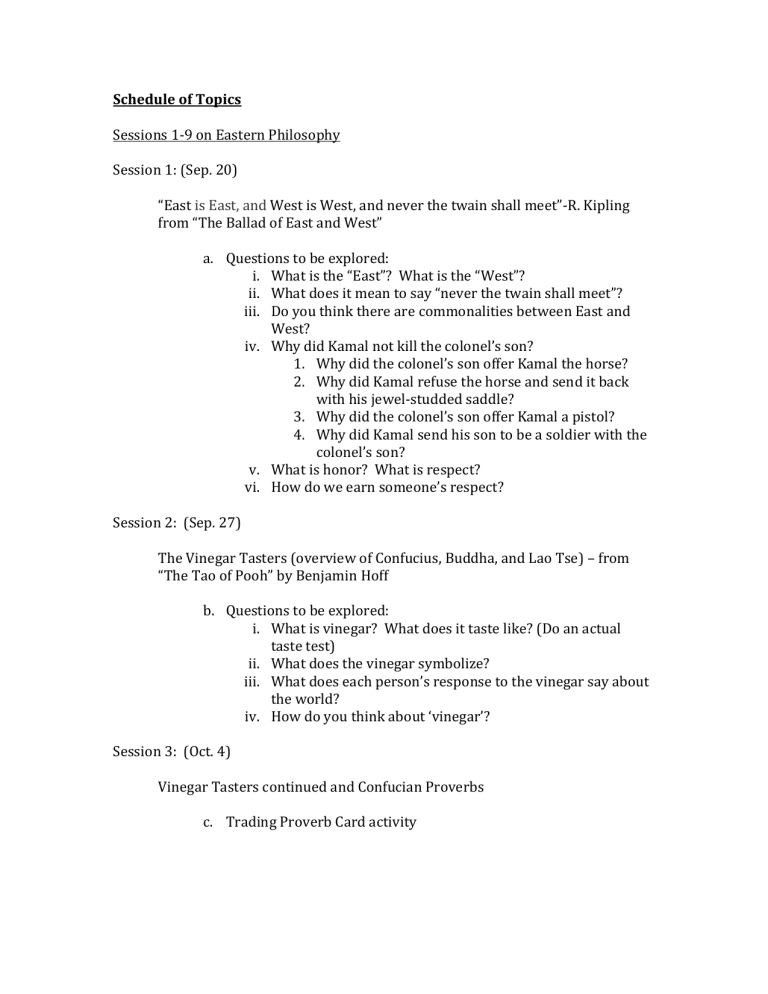
Schedule of Topics
Sessions 1-9 on Eastern Philosophy
Session 1: (Sep. 20)
“East is East, and West is West, and never the twain shall meet”-R. Kipling from “The Ballad of East and West” a.
Questions to be explored: i.
What is the “East”? What is the “West”? ii.
What does it mean to say “never the twain shall meet”? iii.
Do you think there are commonalities between East and
West? iv.
Why did Kamal not kill the colonel’s son?
1.
Why did the colonel’s son offer Kamal the horse?
2.
Why did Kamal refuse the horse and send it back with his jewel-studded saddle?
3.
Why did the colonel’s son offer Kamal a pistol?
4.
Why did Kamal send his son to be a soldier with the colonel’s son? v.
What is honor? What is respect? vi.
How do we earn someone’s respect?
Session 2: (Sep. 27)
The Vinegar Tasters (overview of Confucius, Buddha, and Lao Tse) – from
“The Tao of Pooh” by Benjamin Hoff b.
Questions to be explored: i.
What is vinegar? What does it taste like? (Do an actual taste test) ii.
What does the vinegar symbolize? iii.
What does each person’s response to the vinegar say about the world? iv.
How do you think about ‘vinegar’?
Session 3: (Oct. 4)
Vinegar Tasters continued and Confucian Proverbs c.
Trading Proverb Card activity
Session 4: (Oct. 11)
Buddhist Story of the “Four Harmonious Friends” d.
Questions to be explored: i.
Why were the friends bickering? ii.
Upon what basis does the Buddha suggest resolving differences? iii.
Why does the Buddha place such value on age? iv.
Do you think that the friends would have come to peace with each other if they had agreed on one of the other suggestions for who gets the beds? v.
Why do you think that basing preference on age is more fair than basing preference on class, wealth, education, piousness, or whoever came first? vi.
How did the friends resolve the conflict between them?
What does this tell us about friendship?
Session 5: (Oct. 18)
“Four Harmonious Friends” continued
Session 6: (Oct. 25)
Lao Tzu and The Tao of Pooh- Part I, Reintroducing Winnie the Pooh e.
Questions to be explored: i.
Who is the ‘hero’ of Winnie the Pooh? ii.
Why is he considered a hero? iii.
What are the characteristics of the other characters? iv.
How does Pooh accept each for who they are? v.
Who are you? And what is the value of knowing who you are?
Session 7: (Nov. 1)
The Tao of Pooh- Part II, Pooh exemplifying the “Uncarved Block”
Session 8: (Nov. 8)
-“Being Zen” video
-The Story of “A Heavy Load” in “Zen Shorts”
Session 9: (Nov. 15)
The Story of “Uncle Ry and the Moon” in “Zen Shorts”
The Story of “The Farmer’s Luck” in “Zen Shorts”
Sessions 10-18 on Western Philosophy (If course continues into the second term)
Topics could include:
1.
Delphic Oracle on Socrates’ Wisdom (from Plato’s Apology) a.
Knowing that one does not know, but trust in the process
2.
Introduction to Socratic Dialogues
3.
Introduction to Socrates, Plato, and Aristotle
4.
What is friendship? (from Plato’s Lysis)
5.
What is love? (from Plato’s Meno)
6.
Ring of Gyges (from Plato’s Republic)
7.
Are humans essentially good or bad? Allegory of the charioteer and the two horses (from Plato’s Meno)
8.
Introduction to Ethics and Morality
9.
Consequences vs. Intentions
10.
Utilitarianism and the Pursuit of Happiness
11.
Kant and Human Rights
12.
Aristotle and Virtue as the Golden Mean
13.
Virtue of Bravery applied to Bullying
14.
Virtue of Righteous Indignation (research on Kitty Genovese and Tulsa
Massacre)
15.
Flourishing through Practice
16.
Philosophy vs. Sophistry
17.
Plato’s Allegory of the Cave
Sessions 19 - ? on Critical Thinking



